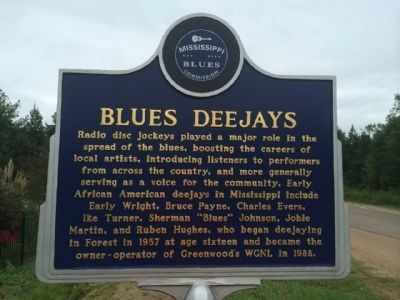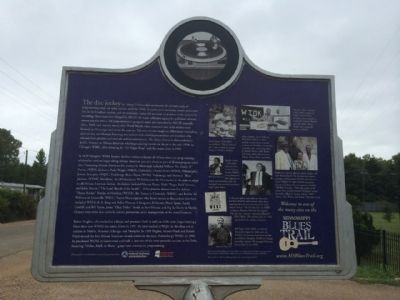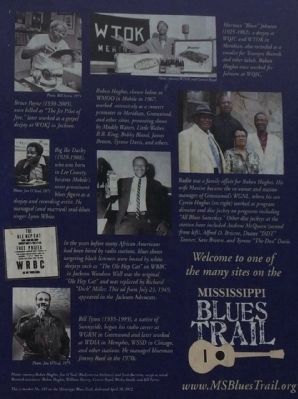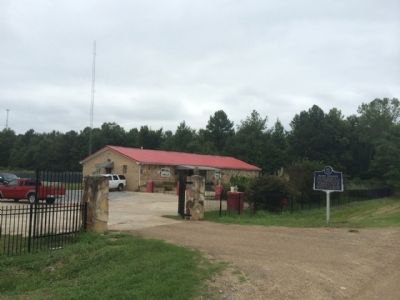Near Greenwood in Leflore County, Mississippi — The American South (East South Central)
Blues Deejays
Front
Radio disc jockeys played a major role in the spread of the blues, boosting the careers of local artists, introducing listeners to performers from across the country, and more generally serving as a voice for the community. Early African American deejays in Mississippi include Early Wright, Bruce Payne, Charles Evers, Ike Turner, Sherman “Blues” Johnson, Jobie Martin, and Ruben Hughes, who began deejaying in Forest in 1957 at age sixteen and became the owner-operator of Greenwood’s WGNL in 1988.
Rear
The disc jockey (or "deejay") format did not become the primary mode of programming music on radio stations until the 1940s. In earlier years musicians usually performed live in the broadcast studios, and the musicians' union did not want its members to be replaced by recordings. Exorbitant fees charged by ASCAP, the major collection agency for publishers of mainstream popular music, led many stations to program music not controlled by ASCAP, especially blues, R&B, and country music, after World War II, when numerous new radio stations were licensed in Mississippi and across the country. The new stations sought to differentiate themselves, and one way was through featuring disc jockeys with colorful personalities and monikers who selected their playlists and read ads and announcements. The deejay format is often credited to Jack L. Cooper, an African American who began playing records on the air in the early 1930s on Chicago's WSBC, after debuting his "All-Negro Hour" with live music there in 1929.
In 1949 Memphis’ WDIA became the first station to feature all-African American programming, while other stations began airing African American specialty shows as part of diverse program schedules. Pioneering African American disc jockeys in Mississippi included William “Dr. Daddy O' Harvey (WJDX, Jackson), Early Wright (WROX, Clarksdale), Charles Evers (WHOC, Philadelphia), Jerome Stampley (WQBC, Vicksburg), Bruce Payne (WVIM, Vicksburg), and Sherman "Blues" Johnson (WTOK, Meridian). In 1954 Jackson’s WOKJ became the first station in the state to adopt an all-African American format . Its deejays included Harvey, Payne, Wade “Poppa Rock” Graves, and Jobie Martin ("The Loud Mouth of the South”). Other popular deejays were Lee Arthur "House Rocker" Rhodes in Meridian (WOKK), Ike Turner in Clarksdale (WROX), and Rockin' Ed Williams in Greenville (WESY). Native Mississippians who found success as disc jockeys elsewhere included WDIA’s B. B. King and Rufus Thomas; Chicagoans Al Benson, Pervis Spann, Lucky Cordell, and Bill Tyson; James “Okey Dokey” Smith in New Orleans; and Big Ike Darby in Mobile. Deejays were often also active in concert promotion, artist management, or the record business.
Ruben Hughes, who worked as a deejay and promoter both in and out of the state, began hosting a blues show over WMAG his native Forest in 1957. He later worked at WQIC in Meridian and at stations in Mobile, Houston, Chicago, and Memphis. In 1969 Hughes, Vernon Floyd, and Robert Floyd started the first African American-owned station in the state, Hattiesburg’s WORV. In 1988 he purchased WGNL in Greenwood and built it into one of the most powerful stations in the Delta, featuring “Oldies, R&B, & Blues," gospel and community programming.
Erected 2012 by the Mississippi Blues Commission. (Marker Number 153.)
Topics and series. This historical marker is listed in these topic lists: African Americans • Arts, Letters, Music • Communications • Entertainment. In addition, it is included in the Mississippi Blues Trail series list. A significant historical year for this entry is 1957.
Location. 33° 31.523′ N, 90° 9.833′ W. Marker is near Greenwood, Mississippi, in Leflore County. Marker is on Ione Street, 0.1 miles north of Highland Avenue, on the left when traveling north. Touch for map. Marker is at or near this postal address: 503 Ione Street, Greenwood MS 38930, United States of America. Touch for directions.
Other nearby markers. At least 8 other markers are within 2 miles of
this marker, measured as the crow flies. Baptist Town (approx. 0.8 miles away); Furry Lewis (approx. 0.9 miles away); "Black Power" Speech (approx. 0.9 miles away); Greenwood Cotton Row District (approx. 1.1 miles away); Elks Hart Lodge No. 640 (approx. 1.1 miles away); WGRM Radio Studio (approx. 1.1 miles away); Endesha Ida Mae Holland (approx. 1.2 miles away); Emmett Till (approx. 1.2 miles away). Touch for a list and map of all markers in Greenwood.
Also see . . . Mississippi Blues Trail. (Submitted on September 17, 2014.)
Credits. This page was last revised on June 16, 2016. It was originally submitted on September 16, 2014, by Mark Hilton of Montgomery, Alabama. This page has been viewed 456 times since then and 20 times this year. Photos: 1, 2, 3, 4. submitted on September 16, 2014, by Mark Hilton of Montgomery, Alabama. • Bernard Fisher was the editor who published this page.



